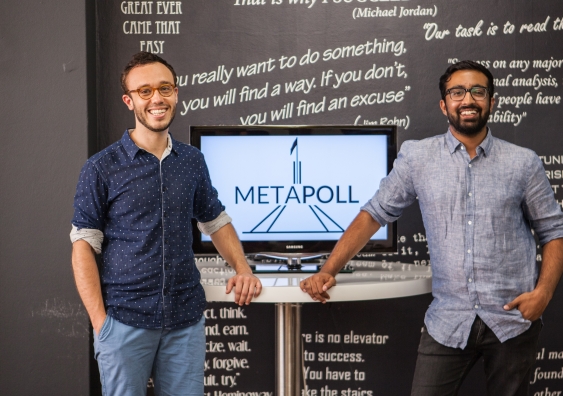New pollster vows to be the most accurate predictor of the federal election
Passionate about politics, two young entrepreneurs from UNSW have developed a public opinion polling platform in time for this year’s federal election.
Passionate about politics, two young entrepreneurs from UNSW have developed a public opinion polling platform in time for this year’s federal election.

Wendy Frew
UNSW Media Office
02 9385 1370
Predicting the outcome of political contests isn’t always easy. Just look at how few people thought real estate tycoon Donald Trump would be leading the race to become the US Republican presidential nominee.
But as Australia enters its own election race, UNSW alumnus Dr Matt Schiller and student Osman Faruqi have launched a new polling platform they say will be “the most accurate predictor of this year’s federal election”.
MetaPoll weighs publically available polling data against accuracy in previous election campaigns to reduce the margin of error. The results are aggregated with MetaPoll’s own polling, and real-time betting odds about an election are also thrown into the mix.
Schiller and Faruqi noticed what appeared to be increasingly inaccurate polling in Australia. With their eye on US polling analyst and political blogger Nate Silver – who famously correctly predicted who would win 49 of the 50 states in the 2008 US election and got all 50 states right in 2012 – they were sure it could be done better in Australia.
“The reason people like what Silver does is because he cuts through the crap,” says Faruqi, who expects to complete his UNSW dual Engineering and Arts degree next year.
“Nothing like that is being done in Australia,” he says.
“So we thought ‘Why don’t we have a go?’”
Schiller and Faruqi met through mutual friends at university. Since then, Faruqi has worked as a political campaigner for the Australian Greens and as a political commentator for the media.
With the polling and media landscapes in a state of disruption this is the perfect time for someone like us
Schiller graduated from medicine in 2012. He has since worked as a consultant at McKinsey and co-founded and runs GownTown with another UNSW graduate Edward Kearney. The start-up sells university graduation outfits for less than what most universities charge to rent them.
Faruqi and Schiller have funded MetaPoll themselves and are now in talks with potential media partners and investors.
With the internet sucking revenue out of traditional media players such as newspapers, who in turn have less money to spend on polling, the two young entrepreneurs believe the timing is right for MetaPoll.
“There is so much data and so many stories emerging from the data,” says Faruqi.
“With the polling and media landscapes in a state of disruption this is the perfect time for someone like us.”
MetaPoll uses online surveys rather than traditional telemarketing or the cheaper and increasingly common Robo polling, where calls are automatically dialled by a computer and surveys are conducted using computer scripts rather than human pollsters.
Faruqi says that means MetaPoll, unlike other polls which can contain demographic biases, can continue surveying random internet users until it gets a demographic mix of responses that reflects the broader population.
“Even using our slightly higher cost system, ultimately our polling solution is still more cost-effective than traditional polling methods," he says.
He and Schiller also want to do in-depth research on which issues actually affect the way people vote – whether that be traditional ‘hip pocket’ issues such as taxes and jobs, or others such as climate change and same-sex marriage.
"In the lead up to this federal election campaign, we are planning on using the data we generate to tell interesting and engaging stories about the electorate,” says Faruqi.
“We want to find the races that matter, and highlight the key issues that are impacting voters, and present that information in an accessible way."